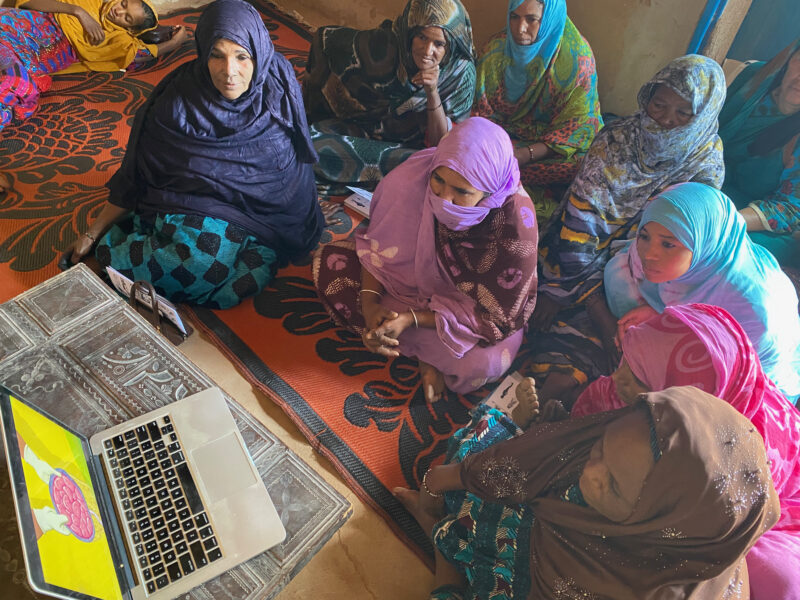Empowering Nomadic Birth Attendants: Reducing Maternal Mortality through Film-Based Training
The Nomad Foundation is a small non-for-profit of committed humanitarians and healthcare educators attempting to reduce maternal mortality among Tuareg and Wodaabe people. For the last six years, they have been using our films to train birth attendants from two nomadic tribes in Northern Niger.
Rebecca Jones is a doctor in obstetrics and gynaecology and trainer with the Nomad Foundation. She works alongside her sister, Patricia Manzon, who is a midwife, and Jen Stevens, a midwife with a doctorate in global health. Here Rebecca tells us more about The Nomad Foundation critical work.
Empowering Nomadic Birth Attendants
I am currently leading a project aimed at training traditional birth attendants, known as “matrones”, from two nomadic tribes in Northern Niger. The women from these tribes frequently give birth while on migration, often without access to skilled assistance. This lack of access has resulted in a shockingly high mortality rate. Our project’s primary goal is to empower these women with the knowledge and supplies necessary to reduce this loss.
Successful Training and Impact of Nomadic Matronas
In 2022 we trained 57 matrones. Many were new but most were there for refresher training. This spring our local trainers held sessions using your films and trained 13 new matrones. As word of the program’s success spreads, more and more communities are requesting the training.

Our total is now 4807 births involving our trained matrones. There have been no maternal mortalities within the encampments (but several after transfer to hospital). The overall maternal mortality rate has been drastically reduced. Without ready access to Caesarean delivery, we can never hope to bring the mortality rate close to that of countries with high-income economies; but things are much improved.
Overcoming Language and Literacy Barriers
A noteworthy challenge we face is that none of these traditional birth attendants has ever attended school. Primarily, they speak their native languages – Tamasheq for the Tuareg tribe, and Fulfulde for the Wodaabe tribe. Unfortunately, most of them are unable to read or write. Despite these challenges, their enthusiasm for learning is inspiring.
Our translators, proficient in French, Hausa, Tamasheq, and some Fulfulde, play a crucial role in our project. Many Wodaabe women understand Hausa, and we often rely on their mutual assistance for effective communication. Unvoiced films or those in Hausa prove most accessible to our learners. However, we believe that films in Tamasheq and Fulfulde would communicate more directly and effectively with them.
We have incorporated four educational films from Medical Aid Films into our training program:
- Ten Steps to a Clean Birth (unvoiced)
- How to Manage Bleeding After Birth (Hausa)
- Understanding Warning Signs of Pregnancy (Hausa)
- How to Care for the Newborn: The First Hours After a Baby is Born
Recently, we showed the film ‘How to Manage Bleeding After Birth’ in Tamasheq. The response was overwhelmingly positive! We are now working on translating this film into Fulfulde, with the ultimate goal of translating all the films into the tribal languages to reach a broader audience.
The matrones have noted that each viewing of these films deepens their understanding. They also find it empowering to see birth attendants like themselves represented in the films, albeit in animation.
The films’ reliance on imagery and repetition rather than text makes them an effective teaching tool, particularly for non-literate individuals.
We are immensely grateful to Medical Aid Films for their invaluable work and their generosity in sharing these powerful resources and to Mr. John Massey who donated his time, expertise, and money to our film project.
Help us train more healthcare workers with our films, in their own language. Support our work today: www.medicalaidfilms.org/donate